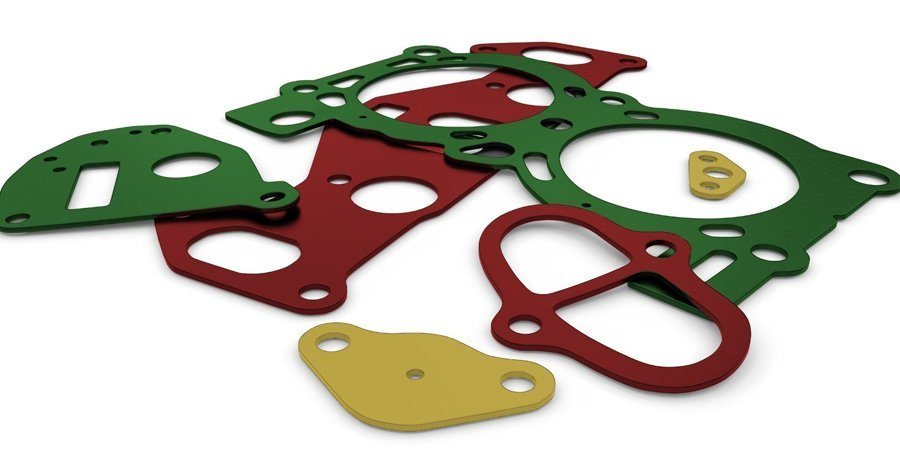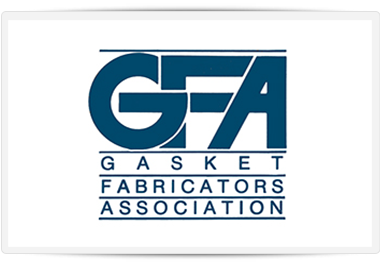While often overlooked, the importance of industrial gaskets can't be overstated. Industrial gaskets are quintessential products employed for sealing, mounting, limiting vibration, and more. Undoubtedly, the main use of the gasket is for sealing.
Because of the range of applications for industrial gaskets and the importance of these components, it's imperative to get the selection of the material right! On one hand, choosing the wrong gasket material could lead to the failure of the component, which could place other equipment, manufacturing, and processes at risk.
On the other hand, overengineering industrial gaskets by using the wrong material can lead to a significant source of waste. Simply put, it's best to get your industrial gasket material right. And the team at Frank Lowe will guide you through the process from conception through to completion.
We are the leading team of manufacturing experts for gaskets industrial facilities need. We offer a full catalog of premium soft, non-metallic products — no matter your industry. Let's take a closer look at some of the most common non-metallic industrial gasket materials.
Why Choose Non-Metallic or Soft Materials for Industrial Gaskets?
Before we dive into the most common types of non-metallic materials for industrial gaskets, we need to explain why non-metallic or soft products perform so well for industrial gaskets. Soft gaskets are designed to compress between two different surfaces with little pressure or tension.
This unique attribute makes them perfect for sealing applications where the fluid contents have low levels of pressure and aren't able to create a leak pathway through industrial gaskets. At the same time, soft, non-metallic gaskets are very cost-efficient, can be used in low-temperature applications, and are available in a range of different materials.
And because there are several different types of non-metallic material, we manufacture solutions with the gasket material that will demonstrate the characteristics necessary to meet or exceed the application requirements.
What Are the Most Common Types of Non-Metallic Industrial Gasket Materials?
At Frank Lowe, we are a full-service die-cutting company offering a complete complement of materials, elastomers, and fenestration products. Each sealing gasket we manufacture will adopt the characteristics of the material it's manufactured from. While the following list is hardly exhaustive, these are some of the most common non-metallic materials we use to fabricate and die-cut industrial gaskets.
Rubber Materials for Industrial Gaskets
One of the top materials used to make industrial gaskets is rubber. This material is available in a vast range of grades and formulations. Examples of sealing rubber materials include:
Cork Materials for Industrial Gaskets
Cork gasket materials are very lightweight, stable materials with the ability to resist water penetration and create reliable seals. Cork industrial gaskets will have excellent flexibility and high compressibility as well as no lateral flow. Cork is unaffected by extreme temperatures and is resistant to wear.
Cork-n-Rubber Materials for Industrial Gaskets
Cork-n-rubber materials are a combination of granulated cork and synthetic rubber polymers. Offering the best of both worlds, cork-n-rubber offers the resilience and high flexibility of rubber with the compressibility of cork.
The addition of rubber also infuses a level of chemical compatibility and forms seals that can resist acid, weathering conditions, and fungus. You can choose from a range of different rubber materials to best meet the chemical resistance needs of the gasket. This material is regularly used in electrical insulation and in industrial gaskets that will perform in this environment.
Natural Rubber Materials for Industrial Gaskets
Natural rubber is regularly employed for its outstanding recovery properties. Natural rubber industrial gaskets boast excellent resistance to most inorganic salts, mild acids, and alkalis. Yet, natural rubber isn't suitable for oils and solvents.
Closed-Cell Sponge Rubber Material for Industrial Gaskets
Closed-cell sponge rubber is composed of cells that are entirely separate from neighboring or surrounding cells. This molecular design helps prevent fluids from intruding, which is critical in sealing applications. You can choose closed-cell industrial gaskets in hard densities, medium densities, and soft densities. Examples of closed-cell sponge rubber materials include:
Open-Cell Sponge Rubber Material for Industrial Gaskets
In contrast to closed-cell sponge rubber industrial gaskets, those made of open-cell sponge rubber have cells that are interconnected. This molecular design allows liquids, gases, and other media to pass through the material.
You can choose industrial gaskets made from open-cell sponge rubber in different durometers or hardnesses. Examples of open-cell sponge rubber materials include:
Silicone Materials for Industrial Gaskets
Silicone industrial gaskets can be either a solid, sponge, or foam. No matter the form, the characteristics are the same, which include high temp stability, general inertness, high-temperature stability, and resilience. Some of the top benefits of using silicone industrial gaskets include:
While suitable for an array of applications, silicone industrial gaskets may not be ideal for environments with steam and hydrocarbons.
Urethane Industrial Gasket Materials
Urethane industrial gaskets offer remarkable aging characteristics and good abrasion. At the same time, urethane industrial gaskets offer:
Neoprene Industrial Gasket Materials
Neoprene industrial gaskets have good resistance to UV and ozone, solid tear strength, and strong resilience. However, it can be easily damaged by petroleum-based fuels. A few key attributes of neoprene industrial gaskets include:
How to Choose the Best Industrial Gasket Material?
But unless you're a gasket material expert, this can be nearly impossible. Fortunately, the expert product engineers at Frank Lowe can help. We specialize in offering in-depth consultative solutions based on the needs of your application.
Once we conduct a needs assessment and have a clear understanding of the gasket application, we can suggest an industrial gasket material that meets or exceeds application requirements without overengineering. In most instances, we will provide our clients with multiple choices, such as:
With each gasket material option, we will explain how the substrate meets the requirements and ways an alternate gasket material may provide more benefits. Most importantly, we will help you see gasket manufacturing through strategic cost-benefit analysis.
Contact Frank Lowe for Industrial Gaskets
No matter your industry, Frank Lowe offers the gaskets industrial facilities need to function. In addition, we provide an array of custom gasket manufacturing services designed to move your project from conception to completion.
For more than 60 years, Frank Lowe has been providing customized solutions across virtually all industries. We will work closely with you to help you meet your unique project or equipment goals.
Contact Frank Lowe today for any type of custom gasket or to learn more about our rubber die cutting services.






